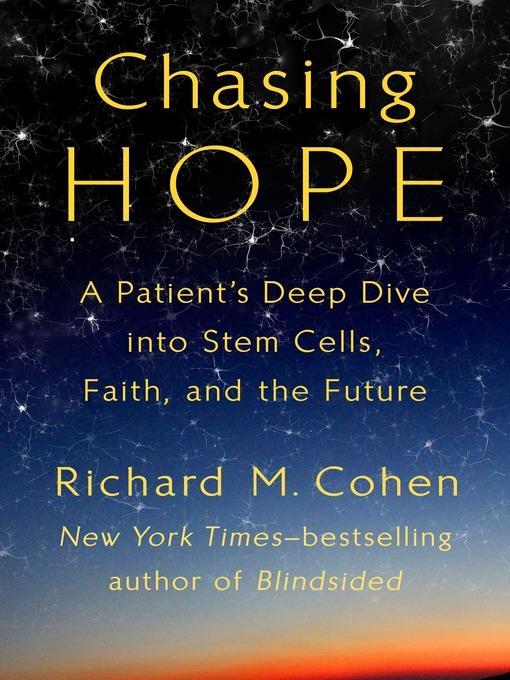
Chasing Hope
A Patient's Deep Dive into Stem Cells, Faith, and the Future
نورونی با همکاری مرکز اطلاعات علمی جهاد دانشگاهی X(Esc) جملهی اصلیAs drily funny as it is emotionally vulnerable , Chasing Hope navigates the fascinating and ever - changing intersection between illness and hope . ترجمیاربه همان اندازه که از لحاظ عاطفی آسیبپذیر است، اما دنبال کردن امید، تقاطع جذاب و همیشه در حال تغییر بین بیماری و امید را هدایت میکند. 5 ترجمه شما به همان اندازه که از لحاظ عاطفی آسیبپذیر است، اما دنبال کردن امید، تقاطع جذاب و همیشه در حال تغییر بین بیماری و امید را هدایت میکند. جملهی بعد سطر جدید جملهی قبل تـرجـمـه پیام خود را وارد نموده و کلید Enter را بزنید تاکنون پیامی ثبت نشده است نسخه ۰.۸.۲ تمامی حقوق برای شرکت پردازش هوشمند ترگمان محفوظ است.حدود : 3 پاراگراف ، 168 کلمهدز حال ذخیره سازی نسخهی پشتیبان... text-translate + اضافه کن
کتاب های مرتبط
- اطلاعات
- نقد و بررسی
- دیدگاه کاربران
نقد و بررسی

March 1, 2018
A longtime multiple sclerosis patient seeks the meaning of hope.For four decades, award-winning journalist Cohen (Strong at the Broken Places: Voices of Illness, a Chorus of Hope, 2008, etc.) has lived with multiple sclerosis, a condition shared by his father and grandmother that has left him legally blind and with impaired movement. Through the years, the author has found many ways to cope with his condition (not to mention with two bouts of cancer), but he rarely thought of himself as having "hope." An invitation to participate in stem cell research changed that. Throughout the book, Cohen touches on a variety of important themes, including how to live with chronic health conditions and the advancement of genetic treatments for such conditions. However, it is mainly a retelling of his own story, a means for catharsis. The author interviewed his children about their memories of him during their childhoods, during which he was prone to intense anger. The lack of any meaningful treatments for MS, as well as the lack of caring physicians, left Cohen with little to anticipate aside from a slowly degrading body. Meeting Dr. Saud Sadiq, however, forced him to look at his future anew. A pioneer in stem cell research for MS and a physician intensely committed to his patients, Sadiq allowed Cohen to experience not only hope for his own condition, but also encouragement that his suffering had not been in vain, that his treatment might lead the way to help for others. A committed nonbeliever, Cohen makes it clear that while many find hope in God--in one form or another--he does not. "For me, belief in the power of hope is linked to belief in the self." Moreover, ties of family and friendship give people the very reason to hope. "Hope is a gift from us to us," writes the author.A clear and concise memoir of introspection, though Cohen's journalistic approach may not provide abundant hope for readers.
COPYRIGHT(2018) Kirkus Reviews, ALL RIGHTS RESERVED.

March 12, 2018
Former TV news producer Cohen charts his search for hope in a light but generally tepid medical memoir. Diagnosed with MS in 1973 at age 25, Cohen realized that his coping mechanisms of denial and withdrawal (which he discussed in his memoir Blindsided) resulted in isolation, frustration, and family rancor. “I had to find a way to rise above the daily grind of illness,” he writes. While hosting a stem cell conference in 2012, he began to entertain hope for a healthier future, despite having undergone “almost forty years of fruitless treatments.” A funny, straightforward narrator (“That doctor had the people skills of a prison guard, minus the charm”), Cohen pursues hope as an intellectual inquiry, interviewing scientists, people who have experienced loss, and diverse religious thinkers. The relationship between hope and faith is an intriguing one, but Cohen dedicates a disproportionate amount of time to it while giving short shrift to themes of regaining lost hope, and how doctors can foster hope in patients. Cohen describes his own stem cell treatment and life-threatening blood clot; however, readers get little sense of how hope helps him deal with these new medical issues. Cohen’s journey is entertaining, but it lacks substance.

April 1, 2018
Cohen, a veteran of television news, delivers an intimate and inspiring account of what it's like to live with a chronic illness, in his case, nearly 40 years of secondary progressive multiple sclerosis (MS). He also experiences two episodes of colon cancer, a blood clot in his leg and lung, optic neuritis, and an autoimmune skin condition. Cohen writes, If there is a god, I thought, He was raising a middle finger to me. Of course, that gesture was absolutely reciprocal. His illnesses impact his family, wife Meredith Vieira and three children. There are outbursts of anger, defiance, denial, and brooding, but resiliency, determination, and hope emerge, too. Cohen launches a contemplative exploration of the notion of hope, including interviews with representatives of different religions and others afflicted with serious diseases. He undergoes an experimental therapy using stem cells injected into his cerebrospinal fluid, but the minimal improvement, somewhat better posture and walking, is disheartening. Still, Cohen's journey with MS and hope continues, reminding readers that believing in a promising future carries us a long way.(Reprinted with permission of Booklist, copyright 2018, American Library Association.)

























دیدگاه کاربران